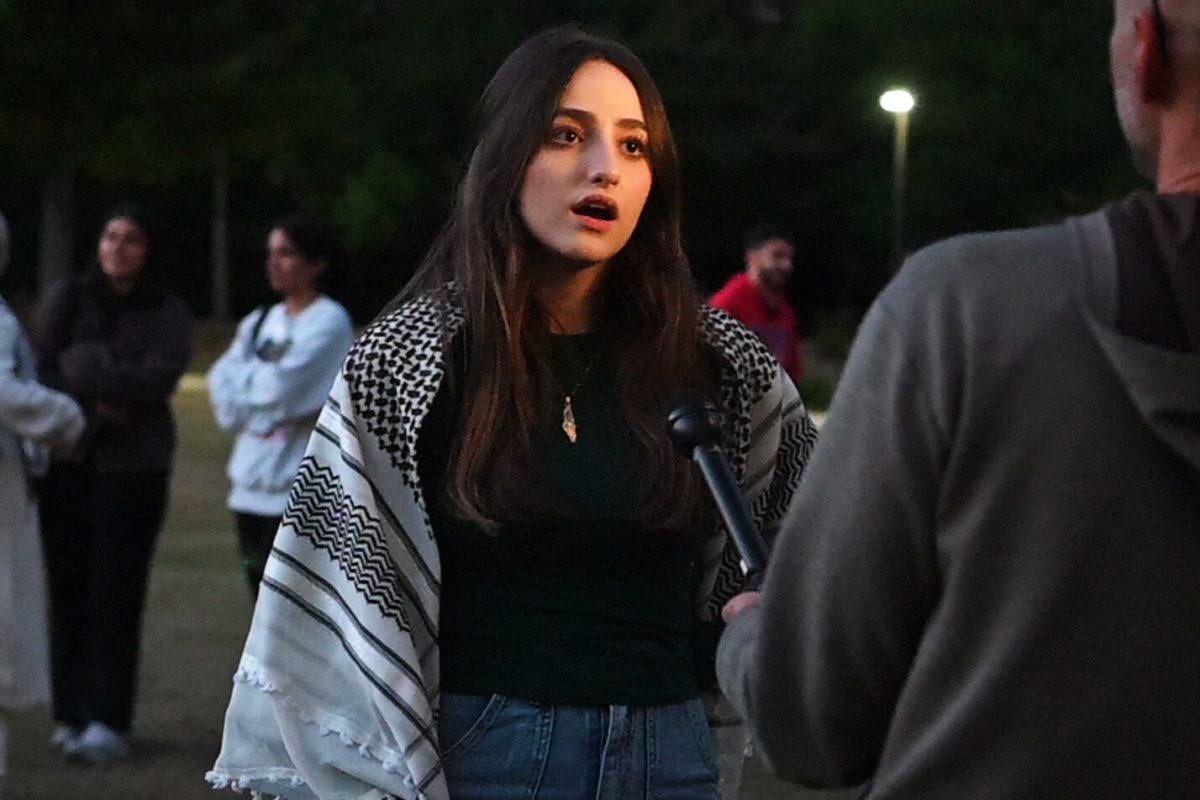
Lily McCabe
Lara Yassin, a fourth-year studying business, gives an interview after the vigil for Palestine hosted by the Arab Student Organization on Wednesday, Oct. 19, 2023. Yassin gave a speech during the vigil. The vigil was held to honor lives lost in the war in Palestine.
Editor’s Note: This article contains reference to death.
Students gathered on Stafford Commons Wednesday evening to mourn the more than 3,700 Palestinians killed in Gaza since the escalation of war between Israel and Hamas on Oct. 7.
“I’m here to really collectively mourn with my community the thousands of lives that we’ve lost in Palestine at the hands of the Israeli regime,” NC State alum Noor Abualhawa said to the crowd.
Approximately 200 students and community members, wrapped in keffiyehs and holding Palestinian flags and “Free Palestine” signs, listened as Abualhawa listed the names of several victims, including the surnames of entire families killed. She urged the crowd to remember the dead as people, not numbers.
“If I could truly do what our martyrs deserve from us, I would sit here until the end of time and list every single one of their names,” Abualhawa said. “I would tell you what families they come from and what they love to do and what their children’s names were. What I can do is name at least a few.”
Several students in attendance have family in Gaza. Lara Yassin, a third-year studying business administration who was born in Gaza, said she has multiple family members who have died in the conflict, most recently her cousin’s daughter.
“When I speak to family members in Gaza, I have trouble finding the right words to say,” Yassin said. “What can you say to people who are trapped in an active war zone?”
Dalia Akkila, a third-year studying communication, lived in Gaza until she was 6 years old. She has extended family in Gaza who have been evacuated from their homes.
“My family was the only one that was able to leave,” Akkila said. “I feel that all the time. Like that could have been me, and I’m like, that should have been me.”
The vigil happened the day after a bombing of a Gaza hospital killed hundreds more Palestinians, though the vigil was planned before this bombing took place.
In addition to mourning the lives lost, students spoke against U.S. support of Israel.
“We need to hold our government officials accountable and demand that the U.S. withdraw all financial support to Israel’s military,” Yassin said.
Leith Abulabda, an NC State alum, said in an address to the crowd that those in the U.S. had a responsibility to speak for Palestinians.
“Right now, in the United States and in the diaspora as a whole, we are the voice of the voiceless,” Abulabda said.
After the speeches, candles were passed through the crowd and attendees observed an uninterrupted moment of silence.
Jamal Mohamad, a fourth-year studying finance, is the president of the Arab Student Organization, the group that organized the vigil. Mohamad said the organization’s events over the past weeks have gone on without conflict or confrontation between students.
However, other students said they have received pushback for things they’ve posted online and said they were generally frustrated with media coverage of the conflict.
“It’s a big frustration, not because you’re mourning and you’re struggling internally, mentally, physically — like it’s exhausting; it’s so hard to focus on school — but then there’s also this other half of you that’s frustrated because you’re having to beg for people to listen,” said Saja Sabha, a second-year studying bioprocessing science and the secretary of the Arab Student Organization.
Mohamad said he intended the vigil to provide comfort for the campus community, but also to educate on and bring awareness to current and historical suffering in Gaza.
“A big part of our current is our past,” Sabha said. “You can’t understand what’s going on now without going back in history.”
Mohamad ended the vigil with a message of hope for attendees.
“Let us leave here tonight with a renewed sense of purpose, carrying the light of Palestine in our hearts and advocating the change we know is possible,” Mohamad said.
If you or someone you know is having difficulty processing grief or having a mental health emergency, the Counseling Center can be reached 24 hours a day at 919-515-2423. If you are in a crisis situation and need immediate help, please call the National Suicide Prevention Lifeline at 988. In the case of a life-threatening emergency, call 911.
The Counseling Center’s website offers free online screenings, a plethora of self-help resources regarding mental health and wellness concerns and a comprehensive list of campus services available for those who need guidance. To view an exhaustive list, visit counseling.dasa.ncsu.edu/resources.
If you’re seeking professional counseling or other mental health services on campus, visit the Counseling Center’s Getting Started page at counseling.dasa.ncsu.edu/about-us/gettingstarted to complete paperwork, set up an appointment and more.